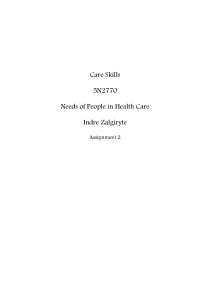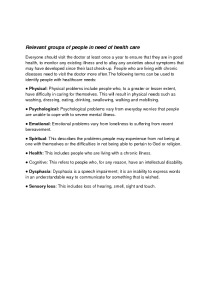Needs Of People In Health Care



Relevant groups of people in need of health care. Care needs of your chosen client. Feeding a Client. Levels of assistance required. Care of the elderly living at home. THE basic needs in life. Prevention of pressure sores , hygiene needs of client. Call your health care provider if you see early signs of pressure ulcers. These signs are. Treat your skin gently to help prevent pressure ulcers. Make sure your clothes are not increasing your risk of developing pressure ulcers. After urinating or having a bowel movement. When You Are in Bed. When to Call the Doctor. Tips to prevent pressure sores. Summarise , conclusions and recommendations.
A growing number of people are living with complex care needs characterized by multimorbidity, mental health challenges and social deprivation. Required is the integration of health and social care, beyond traditional health care services to address social determinants. This study investigates key care components to support complex patients and their families in the community.
Healthcare needs are those that can benefit from health care (health education, disease prevention, diagnosis, treatment, rehabilitation, terminal care). Most doctors will consider needs in terms of healthcare services that they can supply.
Health care is the maintenance or improvement of health via the prevention, diagnosis, treatment, recovery, or cure of disease, illness, injury, and other physical and mental impairments in people. Health care is delivered by health professionals in allied health fields. Physicians and physician associates are a part of these health professionals. Dentistry, pharmacy, midwifery, nursing, medicine, optometry, audiology, psychology, occupational therapy, physical therapy, athletic training and other health professions are all part of health care. It includes work done in providing primary care, secondary care, and tertiary care, as well as in public health.
Everyone should visit the doctor at least once a year to ensure that they are in good health, to monitor any existing illness and to allay any anxieties about symptoms that may have developed since their last check-up. People who are living with chronic diseases need to visit the doctor more often.The following terms can be used to identify people with healthcare needs:
● Physical: Physical problems include people who, to a greater or lesser extent, have difficulty in caring for themselves. This will result in physical needs such as washing, dressing, eating, drinking, swallowing, walking and mobilising.
● Psychological: Psychological problems vary from everyday worries that people are unable to cope with to severe mental illness.
● Emotional: Emotional problems vary from loneliness to suffering from recent bereavement.
● Spiritual: This describes the problems people may experience from not being at one with themselves or the difficulties in not being able to pertain to God or religion.
● Health: This includes people who are living with a chronic illness.
● Cognitive: This refers to people who, for any reason, have an intellectual disability.
● Dysphasia: Dysphasia is a speech impairment; it is an inability to express words in an understandable way to communicate for something that is wished.
● Sensory loss: This includes loss of hearing, smell, sight and touch.
In order to deliver individual care, client wishes must be respected. Clients are entitled to the basic right to have confidential information concerning them and their care restricted to those who have a need or a right to know this information. These include:
- Medicine Individual works
- Microsoft Word 1055 KB
- 2020 m.
- English
- 17 pages (3722 words)
- College
- Indre
















